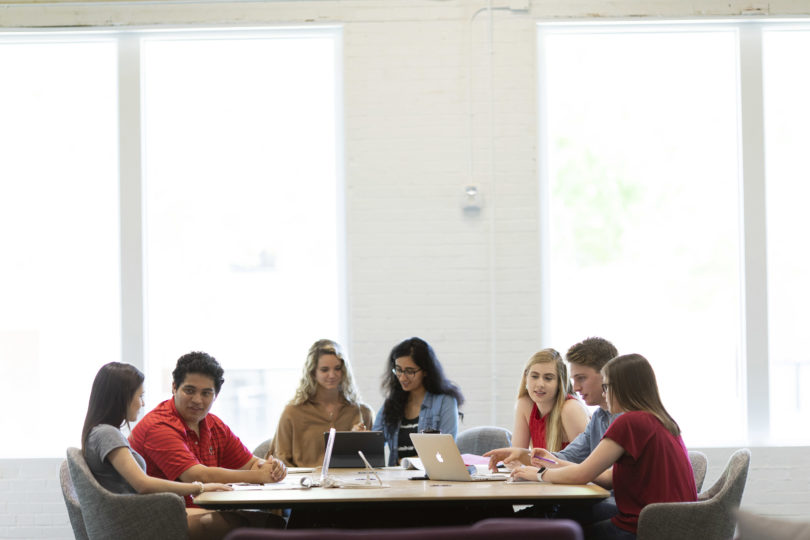For the second year, the Provost’s Affordable Course Materials Grant program will help save students money, enhance the quality of their learning experience and increase their opportunities for success.
This semester, 11 faculty members in nine academic units received funding through the program to transition from costly textbooks to open and affordable educational resources. The $49,000 that was distributed through the program and an additional $10,000 in private support is expected to save students more than $572,000 in textbook costs per academic year. Combined with the results of the first round of funding, the savings to students exceeds $1.3 million.
“The Affordable Course Materials Grant program demonstrates the University of Georgia’s commitment to our students,” said S. Jack Hu, the university’s senior vice president for academic affairs and provost. “Thanks to this program and the dedication of our faculty, even more UGA students can benefit from open educational resources, which reduce costs and also have been shown to improve learning outcomes.”
Through the program, assistant professor of international affairs Molly Berkmeier will transform her introductory international relations course to an article-based one, saving 38 students over $4,100 per class each semester.
“What I have found is that students are most engaged with the simulation and the supplemental articles assigned outside the textbook,” Berkmeier said.
She plans to research contemporary issues that will be important for students to consider in coming years that are not represented in current international relations textbooks.
“These issues include the rise of new technologies and domains such as drones, artificial intelligence, space and cyber,” Berkmeier said.
In the School of Law, instructor Jean Goetz Mangan will use the grant funding to replace her legal writing textbook for first-year students. Mangan said that she has been unable to find a low-cost option that meets her students’ needs, so she plans to create a free open-access, online legal writing manual. This new resource will save 33 students a total of $4,300 each semester.
“Because I can continually change and update the material, there will be no need for students to buy new editions,” Mangan said.
Ben Fahrman, lecturer in the College of Engineering, plans to create statics course materials that are less costly than the current $230 textbook. The financial impact of adopting these open educational resources are expected to save 190 engineering students more than $43,000 per academic year. Fahrman also hopes that better materials will increase opportunities for student success in future courses.
In addition, 1,300 students in first-year English composition courses will see a savings of over $41,000 per academic year thanks to a $10,000 privately funded donation through UGA Libraries. Nate Kreuter, director of the first-year writing program, plans to transition from current textbooks that cost students $162 to free open-access text materials.
The Provost’s Affordable Course Materials Grant program is administered by the UGA Libraries and the Center for Teaching and Learning, both of which offer information and consulting to faculty interested in open and affordable educational resources.
The Provost’s Affordable Course Materials Grant Program complements the Textbook Transformation Grants program that is sponsored by the
Affordable Learning Georgia initiative of the University System of Georgia. Since 2013, faculty adoptions of open educational resources have benefited more than 67,000 UGA students and helped them save over $6.3 million in textbook costs.
Research has shown that Open Educational Resources improve students’ performance and decrease their drop, fail and withdrawal rates. OERs also have been shown to increase student success at an even greater rate for recipients of Pell Grants, part-time students and populations historically underserved by higher education.
“The Affordable Course Materials Grant program is an exemplar of how we as an institution can continue to broaden access for all students,” said Michelle Cook, vice provost for diversity and inclusion and strategic university initiatives. “It also supports innovative practices in the classroom and active learning. We are proud of the work of our faculty in this area and excited about the impact that it continues to have on learning at UGA.”
The 2020 Affordable Course Materials grant recipients are:
• Molly Berkemeier, assistant professor, department of international affairs, School of Public and International Affairs
• Suzanne Pilaar Birch, assistant professor, departments of anthropology and geography, Franklin College of Arts and Sciences
• Charles Byrd, senior lecturer, department of Germanic and Slavic studies, Franklin College of Arts and Sciences
• Leah Carmichael, lecturer, department of international affairs, School of Public and International Affairs
• Ben Fahrman, lecturer, College of Engineering
• Jacob Hicks, lecturer, department of mathematics, Franklin College of Arts and Sciences
• Joseph Hoisington, postdoctoral research and teaching assistant, department of mathematics, Franklin College of Arts and Sciences
• Nancy Knapp, associate professor, department of career and information studies, Early College of Education
• Nate Kreuter, associate professor and director of the first-year writing program, department of English, Franklin College of Arts and Sciences
• Jean Goetz Mangan, instructor, School of Law
• Matt Roessing, lecturer, legal studies program, Terry College of Business








